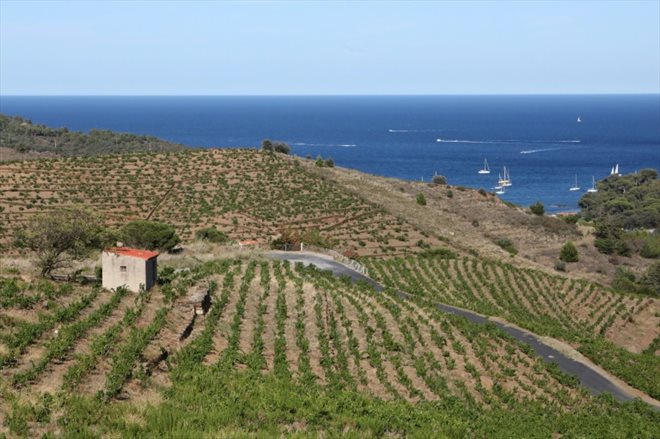The Clos de Paulilles vineyard affected by drought on August 8, 2023 in Port-Vendres, in the Pyrénées-Orientales (AFP/Archives/RAYMOND ROIG)
On the hillsides plunging into the Mediterranean, sparse vines bear grapes that are often too small: after months of drought in the Pyrénées-Orientales, the harvest that is beginning looks particularly weak and fuels fears for the future of the vineyard.
“This one will give three grapes. This one, I’m not sure it will come back next year…”, breathes Lionel Lavail, director of the Cazes estate, in front of a bare plant, completely dried out.
The plots close to the beach are doing better, with only a few yellowed leaves. But the higher vines have not grown enough and some cannot be harvested.

The Clos de Paulilles vineyard affected by drought on August 8, 2023 in Port-Vendres, in the Pyrénées-Orientales (AFP/Archives/RAYMOND ROIG)
On this area of 75 hectares between Banyuls and Port-Vendres, “I will have a 30% drop in the harvest” compared to last year, estimates the 49-year-old winegrower. In the rest of the estate – 220 hectares partly irrigated around Rivesaltes – he predicts losses of around 10%.
“We haven’t even had 200 mm of rain this year… As much as in the Sahara”, laments Julien Thiery, in charge of the vine at the Pyrénées-Orientales Chamber of Agriculture.
According to him, departmental production should barely reach 400,000 hectoliters in total, against more than 550,000 last year and 750,000 ten years ago. The yield will be, he laments, “the lowest we have ever known”: around 20 hectoliters per hectare instead of the usual thirty.
– Go up in altitude? –

The Clos de Paulilles vineyard affected by drought on August 8, 2023 in Port-Vendres, in the Pyrénées-Orientales (AFP/Archives/RAYMOND ROIG)
In the plains of Aspres – an area whose name comes from Catalan and means “arid” – the vines seem very green at first sight. But with his winegrower’s eye, Patrick Mauran, 54, observes too little foliage, which risks not sheltering the grapes enough to allow them to ripen properly.
“We are going to have small berries and therefore less juice”, explains the president of the Terrassous cooperative, who expects a harvest down 40% compared to 2022.
The drought affects almost the entire department and extends over part of eastern neighboring Aude: only crops close to the massifs, which received some rainfall at the end of spring, resist better.

The Clos de Paulilles vineyard affected by drought on August 8, 2023 in Port-Vendres, in the Pyrénées-Orientales (AFP / RAYMOND ROIG)
Patrick Mauran is thinking of moving part of his vines closer to the mountains.
“I started looking at the pitches. It’s not much, 50-100 mm of water per year, so that could be enough. But in ten or twenty years, the situation could be the same there. ..”, he sighs.
Also mayor of a small neighboring town, he nevertheless hesitates out of attachment to his territory. In his eyes, an alternative could be to replace his vines with another crop: “Why not aloe vera?”.
– Climate “laboratory” –
The 2023 vintage is indeed not the only one in danger: winegrowers fear that the plants, exhausted by this year’s drought, will die or bear even less fruit next year. Especially since global warming is expected to multiply dry years and the instability of the seasons.
“It’s a bit of a laboratory that allows us to see how it manifests itself. What is happening in the Pyrénées-Orientales today is perhaps what will happen in ten years in the Rhône valley”, suggests Jean- Marc Touzard, research director at Inrae.

The Clos de Paulilles vineyard affected by drought on August 8, 2023 in Port-Vendres, in the Pyrénées-Orientales (AFP/Archives/RAYMOND ROIG)
At the Chamber of Agriculture, Julien Thiery fears that more and more winegrowers are throwing in the towel. “We even have young people who are taking steps to stop,” he says.
Some, like Lionel Lavail, argue that the solution is irrigation, restricted by prefectural decree and prohibited in certain appellations.
Jean-Marc Touzard believes that winegrowers can also play on the diversification of grape varieties, soil management, a move upmarket of wines or the development of services such as wine tourism.
But in a context of overproduction of red wines in France compared to the market, “it will be complicated to ask for both subsidies to irrigate and to distill” the surplus, he underlines.
© 2023 AFP
Did you like this article ? Share it with your friends with the buttons below.




